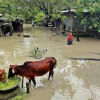‘To Hell with Good Intentions’: Decolonising disaster management

I borrowed the title from Ivan Illich, from his address to the Conference on InterAmerican Student Projects (CIASP) in Cuernavaca, Mexico, on April 20, 1968. I find his remarks on the well-intended yet deeply problematic tendency of paternalism inherent in any voluntary service still relatable in the context of Bangladeshi development activities. I often go back to his remarks on how we can easily cause more harm than good with our "saviour complex" and naivety through community activities and NGO-led disaster management programmes. Despite the geographical and cultural differences, some human behaviours seem to remain the same even after so many years, and they need to be addressed critically, especially when the reality is dire and vulnerable lives are at stake.
I got involved in disaster management after the Rana Plaza collapse in 2013. Without any prior experience, I started my work by going to Savar and visiting different hospitals, talking to the survivors and the members of the missing workers, and making a database with a bunch of fellow activists. Eleven years ago, the urge to make a difference was fuelled by our youth and newfound digital access to information and resources. It took me a few iterations of reality checks and intuitive actions to learn how important it was to understand when to wait and when to act.
After a successful youth-led mass uprising against an autocratic government, it is natural that the enthusiasm to rebuild the country would intensify. Everyone wants to play a role in the process and do good. If politically inexperienced youth can oust a tyrant prime minister, why can't they battle with the flood that has engulfed a part of the country alone? As much as I appreciate this goodness of heart and well-intended involvement, I cannot help but worry about the possible mismanagement and mistreatment that could easily be avoided.
When the lockdown was imposed at the beginning of the pandemic, many garment workers lost employment. Distressed by this reality, a young friend of mine said that she wanted to do something for the women in the garment industry. She came up with the idea to distribute free menstrual cups among the women. For those who do not know, a menstrual cup is a cup-shaped silicone container that collects menstrual blood from the vagina. As it is reusable and can last many years, it has gained popularity as an environment-friendly and economical alternative to other menstrual products, like sanitary pads and tampons. However, it cannot be an emergency need for a woman struggling to make ends meet. Besides, using a menstrual cup might need some time and mental readiness to get used to. No matter how well intended the efforts are, expecting someone to be open to adapting a new habit during a disaster can seem insensitive, if not cruel.
When a friend active in the relief work of Dhaka University asked for sanitary pads to be sent to Feni, I asked him what kind they wanted. He did not seem to know much about the variation of menstrual products in the market. I had already seen people sending reusable cloth pads to flood-ridden areas. Assuming that washing and drying those pads would be another hassle or impossibility during the flood, I chose to send reusable sanitary pads with belts. Even many women did not know that belted pads existed. They asked why panties were not being sent along with the pads. I do not blame the urban women for not knowing any better—after all, they've never had to leave home in one cloth, survive in water for days, and not have the luxury of owning or getting accustomed to undergarments. However, I would hold myself accountable in such situations if I failed to ask the survivors what they need. Even though I would vouch for menstrual cups or even tampons for comfortable menstruation underwater, I must be aware of my privilege and be mindful of not depriving someone else of the choice to disagree with me.
There is a fine line between saving someone and helping them, and so is between empathy and sympathy. My organisation stopped receiving thrifted clothes long ago, after discovering that people would often donate discarded clothes that otherwise might have ended up in dump yards. Sorting and recycling these clothes during a disaster was a hassle too big for a small organisation like ours. I realised empathy started with respecting someone by treating them as an equal to ourselves, by putting ourselves in their position, trying to imagine their lived reality, and accepting our failure to live that. I worked for a small NGO for a short period. I was shocked to find out that the donor organisation would demand extremely sensitive personal information and photos of the survivors to approve the budget. While I understand the lack of trust stemming from deeply-rooted corruption in disaster management, every time I see people refusing to receive emergency aid to avoid being photographed, I feel the failure of being a human.
I have observed that the first response to any disaster from average urban and expatriate Bangladeshis is usually to send money. I am aware that money is a necessary evil, especially during an emergency crisis. However, if not managed well, it can further disrupt the system and relations. I cannot thank the students for announcing daily accounts of donations during the flood to keep transparency. I hope the energy sustains and we stay together on this long battle of recovering from the damage to human lives. In a disaster-ridden country like ours, it is easy to shift focus and financial interest for some. However, those who lost their home and dear ones would need well-intended, skilled, and adaptive volunteers to rebuild a dignified life. Though a small fraction of society might visit the flood zones merely for fun or views on social media, I have immense trust in the youth who sacrificed their lives to restore democracy in our country. I look forward to transitioning into a kinder and equitable future with them.
Trishia Nashtaran is a feminist organiser and foresight strategist.
Views expressed in this article are the author's own.
Follow The Daily Star Opinion on Facebook for the latest opinions, commentaries and analyses by experts and professionals. To contribute your article or letter to The Daily Star Opinion, see our guidelines for submission.

 For all latest news, follow The Daily Star's Google News channel.
For all latest news, follow The Daily Star's Google News channel. 









Comments